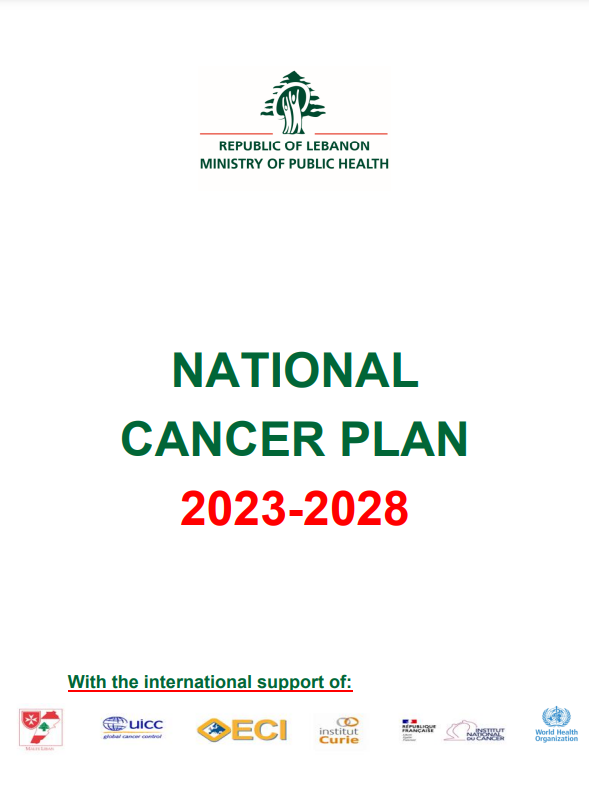
Plan Type: Sectoral Plan
Member State: Lebanon
Document Language: English
As Lebanon faces challenges deeply impacting its health system, it's with a sense of resolve and hope that I write this introduction to Lebanon’s inaugural National Cancer Plan.
Born out of an earnest collaboration with national and international experts, this plan represents our unwavering dedication to rekindle hope, dignity, and zest for life among those affected by cancer.
It is a meticulously designed blueprint that encompasses not only prevention, early detection, and state-of-the-art treatment, but it also addresses the emotional well-being of patients and communities.
Pillars & Objectives
- Supporting the National Cancer Registry (NCR) by developing a strategic vision, issuing comprehensive annual cancer reports, and collaborating with various data sources to include survival, stage, and mortality indicators.
- Creating a surveillance system for cancer-related risk factors by establishing a longitudinal cohort from the general population to guide preventive programs and policies.
- Improving dietary habits and preventing obesity-related cancers through educational campaigns and legislation.
- Encouraging physical activity with community-wide campaigns and training healthcare providers.
- Developing a comprehensive anti-smoking strategy including implementation of tobacco laws, excise taxes, and public campaigns.
- Strengthening alcohol control through excise taxes, advertising bans, and psychosocial interventions.
- Controlling air pollution, pesticides, and other environmental pollutants by raising public and occupational awareness and collaborating with relevant ministries.
- Improving HPV vaccination rates by including it in the national immunization calendar.
- Maintaining free access to hepatitis B vaccination.
- Expanding cervical cancer screening coverage to achieve WHO targets.
- Strengthening the national breast cancer screening program through impact assessment and addressing barriers.
- Improving the uptake of colorectal cancer screening through public awareness campaigns and third-party payer advocacy.
- Conducting cost-effective analyses for lung cancer screening and educating healthcare providers about prostate cancer screening.
- Developing systematic coordination among healthcare players by defining Cancer Reference Centers and regional oncology networks.
- Improving medical diagnostics of cancer patients by establishing accreditation processes and standardizing pathology reports.
- Improving access to innovative diagnostic and therapeutic tools by accrediting oncology-specific imaging and radiation therapy facilities.
- Strengthening paramedical training programs for oncology pharmacists, nurses, and physiotherapists.
- Improving care for children with cancer by establishing dedicated care networks and ensuring free diagnostic work-ups.
- Adapting oncology care to the needs of patients aged 70 and older through comprehensive assessments and tailored treatments.
- Raising public awareness of palliative care and integrating it into routine cancer care.
- Enabling patient-centered care and shared decision-making through truth-telling and advanced care planning frameworks.
- Making palliative care available and accessible by building capacity and providing education and training for healthcare providers.
- Reimbursing palliative care services across different settings.
- Supporting the development of hospital and community-based palliative care services.
- Promoting palliative care research by identifying research priorities and financing research efforts.
- Addressing social barriers affecting cancer patients by ensuring loan and insurance access, job retention, at-home care services, and participation in hospital life.
- Supporting patients and advocacy groups in providing educational and psychosocial support.
- Creating a "Cancer Program" within the Ministry of Public Health (MOPH) with a clear governance structure.
- Guiding the implementation of the National Cancer Plan with health technology assessment (HTA).
- Inviting all Lebanese healthcare organizations and societies to align their initiatives with the National Cancer Plan.
 ESCWA
ESCWA





